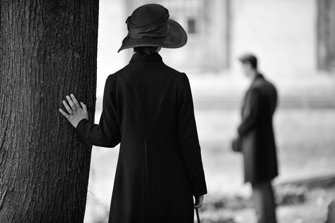
François Ozon’s already prolific output of films is evidence of one of two things. Take your pick: 1. He is an outrageously talented director who revels in the variety of themes and styles that filmmaking affords him. 2. He is an outrageously talented director who spreads himself far too thinly and cannot settle upon a recognizable style.
I must admit to veering between these two opinions. And my indecision was certainly not clarified by his latest offering, Frantz, which premiered at this year’s Venice International Film Festival.
Ozon acknowledges his debt to the great director Ernst Lubitsch’s 1932 film Broken Lullaby, claiming to have been “freely inspired” by it. In fact, the plot of the first half of Frantz (shot mostly in German) is almost identical to that of the Lubitsch work. In the aftermath of World War I, French violinist Adrien (played by Pierre Niney, who made his cinematic name as the lead character in the biopic Yves Saint Laurent) is observed in a small German town laying flowers on the grave of slain German soldier Frantz by the dead man’s fiancée Anna (Paula Beer).
Intrigued by this clearly traumatized young man, Anna, along with Frantz’s mother and – after his initial resistance to accepting a Frenchman in his household – father welcome Adrien into their home. The young violinist gradually recounts the friendship that the two men shared before the war when Frantz was in Paris.
In Lubitsch’s version, which itself was based on a play, L’Homme que J’ai Tué, by the French playwright Maurice Rostand, the Frenchman is accepted as a second son by the German family. In Frantz, Adrien eventually leaves for Paris, later pursued by Anna, who becomes the central figure in the film.
It would be unfair to reveal the many plot twists in Ozon’s movie, but he plays upon a number of ambiguities in the nature of the relationship between Frantz and Adrien, and how they first met. As various truths emerge, just as many lies are told to different characters in the film. While Ozon deftly confounds our expectations, his movie would have benefited from tighter editing (unlike Lubitsch’s films, which are always wonderfully concise).
Ozon shot the film mostly in black and white, but he occasionally uses color, as in a scene when Adrien recalls teaching Frantz to play the violin and visiting the Louvre with him, or when Anna and Adrien go for a walk together and she watches him swim in the lake. Playing with both black and white and color in films has become a rather tired trick, but Ozon’s use of it is discreet and just manages to steer clear of self-satisfied cleverness.
Paula Beer is incandescent as Anna as she moves from the constraints of grief to the liberation of being an independent woman in Paris attempting to track down the elusive Adrien. By contrast, Liney is somewhat one-dimensional as Adrien, but his role perhaps offered little opportunity for development.
Even though Frantz can seem like a pastiche or homage (depending on your point of view), it is eminently watchable and absorbing. We will await Ozon’s next film with eagerness, and once again, no doubt, he will confound our expectations with something completely different.
Favorite